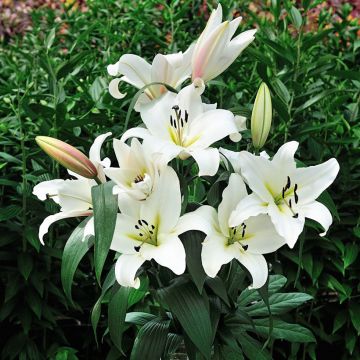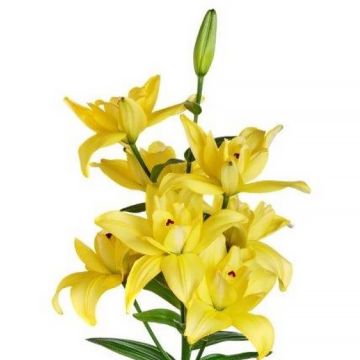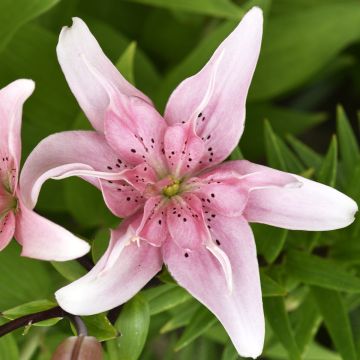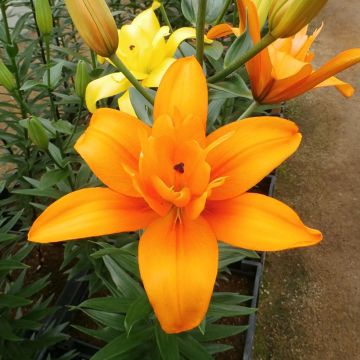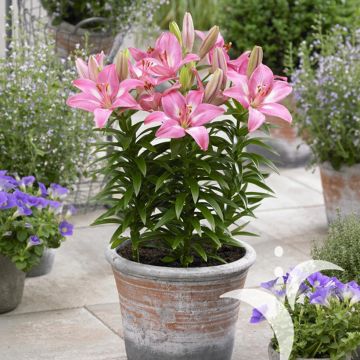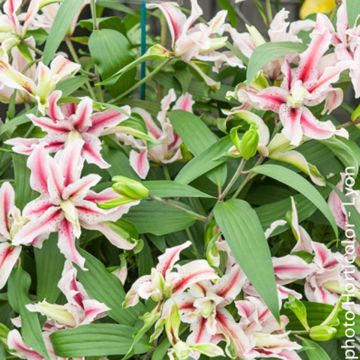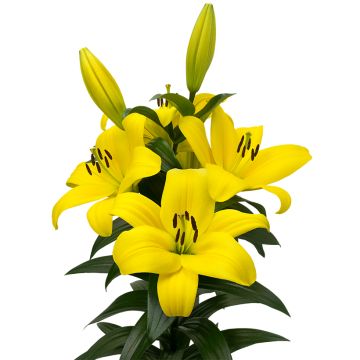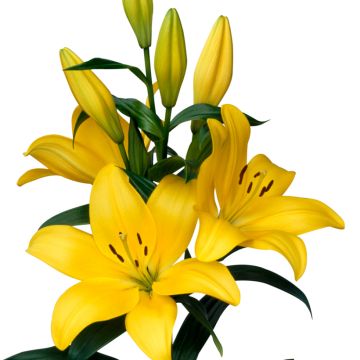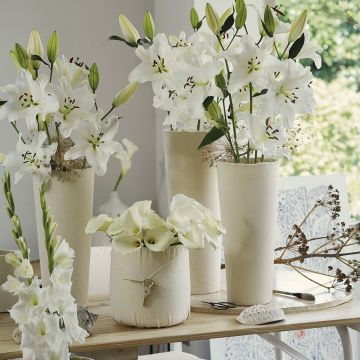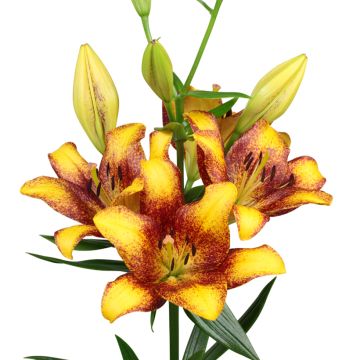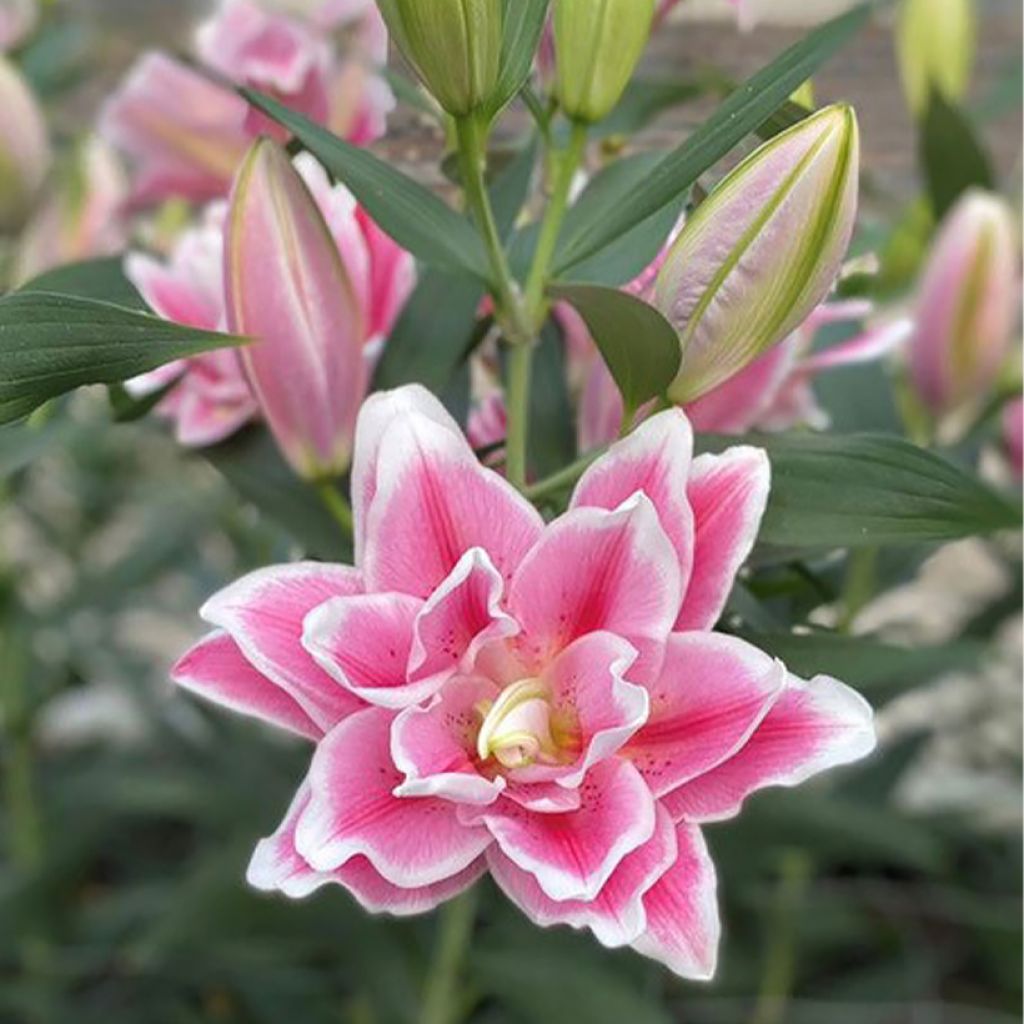

Lilium Roselily Mikaela - Lily
Lilium Roselily Mikaela - Lily
Lilium Roselily Mikaela
Lily
This item cannot be shipped to the selected country
Delivery charge from €5.90
More information
Schedule delivery date,
and select date in basket
This plant carries a 6 months recovery warranty
More information
We guarantee the quality of our plants for a full growing cycle, and will replace at our expense any plant that fails to recover under normal climatic and planting conditions.
From €5.90 for pickup delivery and €6.90 for home delivery
Express home delivery from €8.90.
Does this plant fit my garden?
Set up your Plantfit profile →
Description
The Oriental Lily 'Roselily Mikaela' is a variety with double flowers that belongs to the group of oriental lilies. It offers large upward-facing flowers with pink colour, speckled and marked in the middle with magenta and edged in pale pink to white, without pollen. The centre of the flower is infused with a pale yellow halo. The fully double flowers have layers of overlapping petals and, as they are devoid of pollen, they last longer and have a lighter scent than simple oriental hybrids. Robust, this oriental lily blooms faithfully in very well-drained, limestone-free soil in a border, in a pot or even in a large rockery.
The genus Lillium belongs to the lily family, its representatives are bulbous plants whose deciduous vegetation disappears in winter. In spring, leafy stems emerge from the ground, rising and forming a narrow and very vertical clump. 'Roselily Mikaela' is a horticultural hybrid obtained by the cross-breeding of various species originating from the Far East. This plant reaches approximately 1 m in height when in bloom, and the clump spreads indefinitely over time, with bulbs producing bulblets through vegetative propagation. In August, umbels of flowers appear, facing outwards, well displayed. They are trumpet-shaped, very wide, measuring up to 20 cm in diameter, and are very pleasantly fragrant. The stems are sturdy, covered with alternate, dark green, shiny, lanceolate leaves.
Oriental lilies require specific conditions to thrive, slightly more demanding than those of Asian lilies. They appreciate a humus-rich, well-drained, non-calcareous soil, as excess moisture in winter can harm the bulbs. In acidic soil, their colours intensify. Partial shade, especially in the afternoon, helps prolong flowering and preserve the flowers' brightness. For an elegant border, the Lilium 'Roselily Mikaela' pairs well with pink, yellow, red, or white lilies, gladioli, or daylilies. Grasses and perennials around the lily help shade the ground and stabilize the stems against the weather. Oriental lilies also thrive at the edge of a woodland, surrounded by small bushes such as rhododendrons or azaleas, and are perfect for creating beautiful bouquets.
Report an error about the product description
Plant habit
Flowering
Foliage
Botanical data
Lilium
Roselily Mikaela
Liliaceae
Lily
Cultivar or hybrid
Other Lilies
Planting and care
The 'Roselily Mikaela' lily does not appreciate calcareous, poorly drained, and heavy soils. You will plant it in full sun, with the base in the shade, preferably in spring, burying the bulbs 15 cm deep in a pocket of soil mixed with leaf compost. Surround them with a pocket of sand to prevent rot and slug attacks, while allowing them to grow more easily. Mark the planting location, as vegetation only starts in April. When the stems reach 30 cm high, discreetly stake them. Some afternoon shade in summer is appreciated to maintain the intensity of the colours.
If red insects appear, treat them immediately; they are red lily beetles whose larvae can devour all the leaves. The most effective method is to catch them by hand; be careful, they drop as soon as you touch them, so place a box underneath. Otherwise, treat regularly with permethrin.
After flowering, it is useful to cut the faded flowers halfway to keep the bed beautiful during the summer.
Tip for planting lilies in compact soil: The scaly bulbs of large lilies fear clayey soils that suffocate them and cause rot. In Eastern Europe, the following technique is used to help these bulbs survive the winter. Plant them on 'benches' built above ground level. These benches consist of a first layer of gravel, on which well-packed branches are placed. Cover everything with a thick layer of leaf compost, 20 to 30 cm deep. Plant the bulbs in the compost, on which a few ground cover plants can also be placed.
On the terrace, you can create sumptuous pots with lilies. Choose a container that is wide and deep enough (at least 16 cm in diameter for 1 bulb). Fill it with a mix of leaf compost and sand. Plant the lilies in groups of 3 to 5 bulbs, 10-15 cm apart, then water generously. Place the pots in a cool room or outside once the frost has passed. The ambient temperature should be around 12°C. When the shoots appear, place the pot in a bright veranda or room, at a temperature of around 18°C. Apply liquid fertilizer twice a month until the flower buds appear.
Planting period
Intended location
Care
This item has not been reviewed yet - be the first to leave a review about it.
Haven't found what you were looking for?
Hardiness is the lowest winter temperature a plant can endure without suffering serious damage or even dying. However, hardiness is affected by location (a sheltered area, such as a patio), protection (winter cover) and soil type (hardiness is improved by well-drained soil).

Photo Sharing Terms & Conditions
In order to encourage gardeners to interact and share their experiences, Promesse de fleurs offers various media enabling content to be uploaded onto its Site - in particular via the ‘Photo sharing’ module.
The User agrees to refrain from:
- Posting any content that is illegal, prejudicial, insulting, racist, inciteful to hatred, revisionist, contrary to public decency, that infringes on privacy or on the privacy rights of third parties, in particular the publicity rights of persons and goods, intellectual property rights, or the right to privacy.
- Submitting content on behalf of a third party;
- Impersonate the identity of a third party and/or publish any personal information about a third party;
In general, the User undertakes to refrain from any unethical behaviour.
All Content (in particular text, comments, files, images, photos, videos, creative works, etc.), which may be subject to property or intellectual property rights, image or other private rights, shall remain the property of the User, subject to the limited rights granted by the terms of the licence granted by Promesse de fleurs as stated below. Users are at liberty to publish or not to publish such Content on the Site, notably via the ‘Photo Sharing’ facility, and accept that this Content shall be made public and freely accessible, notably on the Internet.
Users further acknowledge, undertake to have ,and guarantee that they hold all necessary rights and permissions to publish such material on the Site, in particular with regard to the legislation in force pertaining to any privacy, property, intellectual property, image, or contractual rights, or rights of any other nature. By publishing such Content on the Site, Users acknowledge accepting full liability as publishers of the Content within the meaning of the law, and grant Promesse de fleurs, free of charge, an inclusive, worldwide licence for the said Content for the entire duration of its publication, including all reproduction, representation, up/downloading, displaying, performing, transmission, and storage rights.
Users also grant permission for their name to be linked to the Content and accept that this link may not always be made available.
By engaging in posting material, Users consent to their Content becoming automatically accessible on the Internet, in particular on other sites and/or blogs and/or web pages of the Promesse de fleurs site, including in particular social pages and the Promesse de fleurs catalogue.
Users may secure the removal of entrusted content free of charge by issuing a simple request via our contact form.
The flowering period indicated on our website applies to countries and regions located in USDA zone 8 (France, the United Kingdom, Ireland, the Netherlands, etc.)
It will vary according to where you live:
- In zones 9 to 10 (Italy, Spain, Greece, etc.), flowering will occur about 2 to 4 weeks earlier.
- In zones 6 to 7 (Germany, Poland, Slovenia, and lower mountainous regions), flowering will be delayed by 2 to 3 weeks.
- In zone 5 (Central Europe, Scandinavia), blooming will be delayed by 3 to 5 weeks.
In temperate climates, pruning of spring-flowering shrubs (forsythia, spireas, etc.) should be done just after flowering.
Pruning of summer-flowering shrubs (Indian Lilac, Perovskia, etc.) can be done in winter or spring.
In cold regions as well as with frost-sensitive plants, avoid pruning too early when severe frosts may still occur.
The planting period indicated on our website applies to countries and regions located in USDA zone 8 (France, United Kingdom, Ireland, Netherlands).
It will vary according to where you live:
- In Mediterranean zones (Marseille, Madrid, Milan, etc.), autumn and winter are the best planting periods.
- In continental zones (Strasbourg, Munich, Vienna, etc.), delay planting by 2 to 3 weeks in spring and bring it forward by 2 to 4 weeks in autumn.
- In mountainous regions (the Alps, Pyrenees, Carpathians, etc.), it is best to plant in late spring (May-June) or late summer (August-September).
The harvesting period indicated on our website applies to countries and regions in USDA zone 8 (France, England, Ireland, the Netherlands).
In colder areas (Scandinavia, Poland, Austria...) fruit and vegetable harvests are likely to be delayed by 3-4 weeks.
In warmer areas (Italy, Spain, Greece, etc.), harvesting will probably take place earlier, depending on weather conditions.
The sowing periods indicated on our website apply to countries and regions within USDA Zone 8 (France, UK, Ireland, Netherlands).
In colder areas (Scandinavia, Poland, Austria...), delay any outdoor sowing by 3-4 weeks, or sow under glass.
In warmer climes (Italy, Spain, Greece, etc.), bring outdoor sowing forward by a few weeks.

































